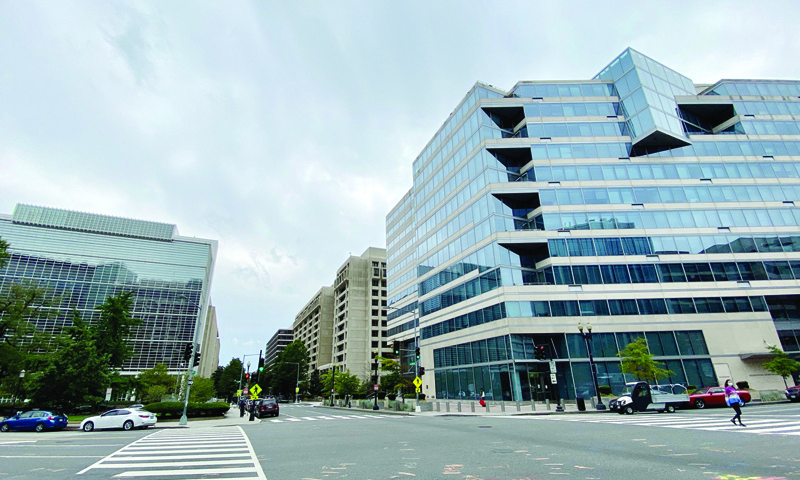 WASHINGTON: File photo shows a general view of the World Bank Group (WBG) building (L) and the International Monetary Fund (IMF) building (R) in Washington, DC on September 25, 2020. - AFP
WASHINGTON: File photo shows a general view of the World Bank Group (WBG) building (L) and the International Monetary Fund (IMF) building (R) in Washington, DC on September 25, 2020. - AFP
JUBA: The IMF has loaned $334 million (284 million euros) to South Sudan, the country's central bank governor said Tuesday, as its ailing economy teeters from a currency crisis and soaring inflation. It is the third time in a year the Washington DC-based lender has extended financial aid to the troubled country, which ran out of foreign exchange reserves last year when oil prices fell sharply. The price slump, brought on by the coronavirus pandemic, deprived the fragile government in Juba of much-needed revenue and sent its currency into freefall.
Earlier this year, one US dollar was fetching 700 South Sudanese Pounds on the black market-the weakest exchange rate since independence a decade ago. Central Bank Governor Dier Tong Ngor said the IMF loan would "substantially boost" foreign reserves and allow room to try and recover in the midst of the pandemic. "The increase in reserves will help build external resilience and sustain the current reforms in the foreign exchange market," Ngor said in a statement seen by AFP.
South Sudan is emerging from five years of civil bloodshed that left 380,000 dead and shattered its economy, which is almost entirely dependent on oil. When it split from Sudan to the north in 2011 following a decades-long war of secession, it took over three-quarters of the oil reserves. But years of civil conflict after independence, including for control of key oil fields, deprived the country of vital income and the chance to diversify its economy. The coronavirus pandemic drove oil prices sharply downward, gutting state coffers for a fragile new unity government that took office in early 2020 at the end of a tortured peace process.
The government has not been able to pay civil servants on time, while the price of basic goods remains stubbornly high. In April, the IMF approved $174 million in emergency support to South Sudan. The previous November, it extended a $52 million loan. Devastating flooding has deepened the economic pain and worsened a humanitarian crisis in the world's newest country, which is enduring its worst hunger levels since independence a decade ago. Corruption and mismanagement are also often blamed for South Sudan's economic troubles.
Meanwhile, Mexico will use the roughly $12 billion that it was allocated by the International Monetary Fund to pay down its debt, President Andres Manuel Lopez Obrador said Tuesday. The move would save the country money by reducing the cost of maintaining the national debt, giving a boost to the public finances, Lopez Obrador told reporters.
Earlier this month, the IMF board of governors approved a $650 billion increase in cash reserves for member nations as they struggle to recover from the economic hit from COVID-19. Emerging and developing nations would receive around $275 billion through the new allocation of Special Drawing Rights (SDRs), a type of international reserve asset created by the IMF in 1969, the lending organization said. IMF head Kristalina Georgieva described the decision as "a shot in the arm for the global economy at a time of unprecedented crisis" due to the coronavirus.
Lopez Obrador is a strong advocate of a low debt policy and was reluctant to ramp up public spending significantly to cushion the economic blow from the pandemic. The Mexican central bank said Monday that it had received the equivalent of about $12.1 billion from the IMF. In the second quarter of 2021, the federal government's net debt stood at 37.4 percent of gross domestic product, according to the finance ministry. - AFP

